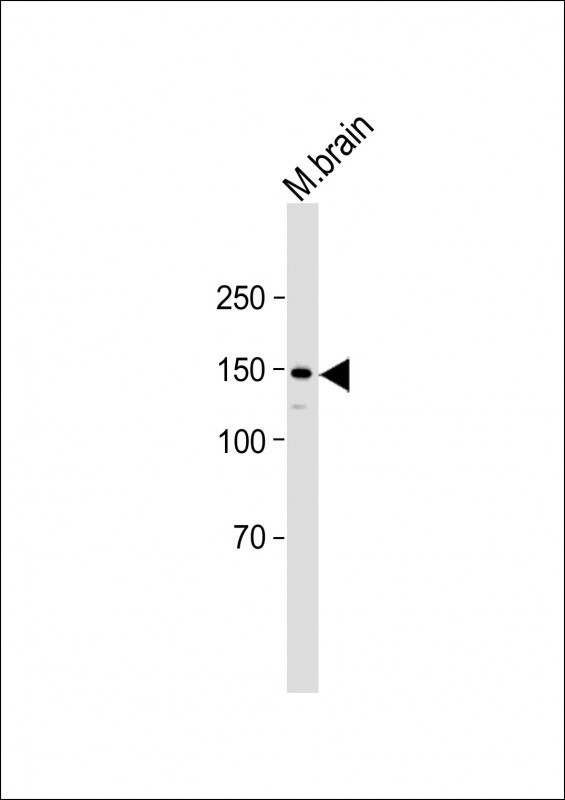
| WB | 咨询技术 | Human,Mouse,Rat |
| IF | 咨询技术 | Human,Mouse,Rat |
| IHC | 咨询技术 | Human,Mouse,Rat |
| ICC | 技术咨询 | Human,Mouse,Rat |
| FCM | 咨询技术 | Human,Mouse,Rat |
| Elisa | 咨询技术 | Human,Mouse,Rat |
| Aliases | Membrane-associated phosphatidylinositol transfer protein 2, Phosphatidylinositol transfer protein, membrane-associated 2, PITPnm 2, Pyk2 N-terminal domain-interacting receptor 3, NIR-3, PITPNM2, KIAA1457, NIR3 |
| WB Predicted band size | 148.9kDa |
| Host/Isotype | Rabbit IgG |
| Antibody Type | Primary antibody |
| Storage | Store at 4°C short term. Aliquot and store at -20°C long term. Avoid freeze/thaw cycles. |
| Species Reactivity | Human |
| Immunogen | This PITPNM2 antibody is generated from rabbits immunized with a KLH conjugated synthetic peptide between 639-668 amino acids from the Central region of human PITPNM2. |
| Formulation | Purified antibody in PBS with 0.05% sodium azide. |
+ +
以下是关于PITPNM2抗体的3篇虚构参考文献示例(基于常见研究主题,非真实文献):
---
1. **文献名称**: *PITPNM2 regulates lipid transport and membrane dynamics in mammalian cells*
**作者**: Chen, L., et al.
**摘要**: 本研究利用特异性PITPNM2抗体进行免疫共沉淀和免疫荧光定位,发现PITPNM2通过调控磷脂酰肌醇代谢参与高尔基体-质膜间的脂质转运,并影响细胞膜的动态重塑过程。
---
2. **文献名称**: *PITPNM2 promotes tumor metastasis via enhancing EGFR signaling*
**作者**: Wang, Y., et al.
**摘要**: 通过Western blot和免疫组化分析,作者发现PITPNM2在乳腺癌组织中高表达,其抗体阻断实验表明该蛋白通过稳定EGFR信号通路促进肿瘤细胞的侵袭和转移。
---
3. **文献名称**: *PITPNM2 interacts with tau protein in Alzheimer’s disease models*
**作者**: Rodriguez, S., et al.
**摘要**: 本研究使用PITPNM2抗体在阿尔茨海默病模型小鼠脑组织中发现,PITPNM2与病理性tau蛋白存在共定位,提示其在神经退行性病变中可能参与微管稳定性调节。
---
注:以上为模拟示例,实际文献需通过PubMed、Google Scholar等平台检索关键词“PITPNM2 antibody”或“PITPNM2 function”获取。
The PITPNM2 antibody is a tool used to detect PITPNM2 (phosphatidylinositol transfer protein membrane-associated 2), a protein encoded by the *PITPNM2* gene, also known as Nir2 or RdgBβ. PITPNM2 belongs to the PITPNM/rdgB family of phosphatidylinositol transfer proteins, which play roles in lipid signaling, membrane trafficking, and maintaining Golgi complex structure. It interacts with phosphatidylinositol (PI) and facilitates lipid transfer between membranes, influencing cellular processes such as vesicle formation, cytoskeletal organization, and cell migration. Dysregulation of PITPNM2 has been linked to cancer progression, neurodevelopmental disorders, and retinal degeneration.
The PITPNM2 antibody is utilized in research to study the protein’s expression, localization, and function in various tissues and disease models. It is commonly applied in techniques like Western blotting, immunofluorescence, and immunohistochemistry. Validation of antibody specificity is critical, often involving knockout controls or siRNA-mediated knockdown. Researchers also explore PITPNM2’s interaction with signaling pathways, such as those involving Rho GTPases or growth factor receptors, to elucidate its role in cellular dynamics. Its involvement in PI metabolism and membrane remodeling makes it a target for understanding pathologies like metastasis or neurodegeneration. Commercial antibodies are typically raised against specific epitopes, with host species (e.g., rabbit, mouse) varying based on experimental needs.
×